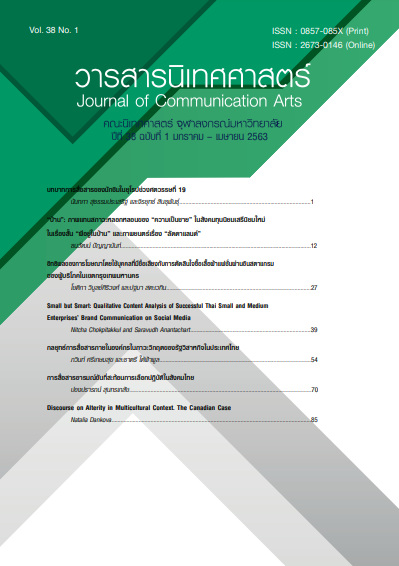“H-O-M-E”: The Representation of Haunted “Masculinity” in the Capitalist and Neoliberal Society in “Phee Yoo Nai Ban” and “Laddaland”
Main Article Content
Abstract
This article aims to study “neo-masculinity (?)” in the capitalist and neoliberal society in Thai society. This study reveals the problems and the weaknesses of the male that are presented through the literature and the film by analyzing the text and representation. The findings elucidate that male characters are pressured and haunted from “new masculinity?” which forms between traditional and capitalist masculinity, constructed by the expectations of capitalist and neoliberal society. Male characters themselves were pressed and they were forced by the wife and her mother. These forces are displayed through the representation of “H-O-M-E” The place that should exhibit happiness and success but it discloses male crisis and tragedy. Beyond the haunting, the texts are question about power of the patriarchy and they are going to show the resistance power of the matriarchy.
Article Details
References
ภาษาไทย
กนกพงศ์ สงสมพันธุ์. (2559). ผีอยู่ในบ้าน. ใน แผ่นดินอื่น (พิมพ์ครั้งที่ 20). กรุงเทพฯ: นาคร.
กร ศิริวัฒโณ. (2561) พิมพ์ครั้งแรก 2560. คนในนิทาน (พิมพ์ครั้งที่ 3). กรุงเทพฯ: นาคร.
ข่าวสด. (2560). เถียงกันมัน! จวกสาวโพสต์ถามทำไมผู้ชายไม่ลุกให้ผู้หญิงนั่งบนรถเมล์-ไม่สงสารกันเหรอ. วันที่เข้าถึงข้อมูล 22 ตุลาคม 2561 แหล่งที่มาhttps://www.khaosod.co.th/special-stories/news_505371
ข่าวสด. (2561). ผัวเมียดวงเฮง รวย 90 ล้าน เผยเคยถูกหวย 8 งวดติด รับซื้อตามความฝัน. วันที่เข้าถึงข้อมูล 1 พฤศจิกายน 2561แหล่งที่มา https://www.khaosod.co.th/around-thailand/news_1770276
ชุติมา ประกาศวุฒิสาร. (2559). ปีศาจทุนนิยมและ “การกินมนุษย์ด้วยกันเอง” ความรุนแรงเชิง เศรษฐกิจในสวยลากไส้ และเหยื่อมาร. ใน สุวรรณา สถาอานันท์และสุรเดช โชติอุดมพันธ์ (บ.ก.), หนึ่งทศวรรษ เวทีวิจัยมนุษยศาสตร์ไทย แว่นตา อารมณ์ สังคม ความจริง (น.241- 284). กรุงเทพฯ: สำนักงานกองทุนสนับสนุนการวิจัย(สกว.).
ไทวิกา อิงสันเทียะ. (2555). บริโภคนิยมที่ก่อให้เกิดวิกฤตความเป็นชายในนวนิยายเรื่องไฟล์คลับ และอเมริกันไซโค. ใน สุรเดช โชติอุดมพันธ์ (บ.ก.) 257-280, ศาสตร์แห่งวรรณคดีคือตรีศิลป์ : ทฤษฎี สุนทรียะ สังคม. 241- 284 กรุงเทพฯ: ศูนย์วรรณคดีศึกษา.
นฤพนธ์ ด้วงวิเศษ. (2558). วิพากษ์ “ความเป็นหญิง” ของหญิงในร่างชาย. วันที่เข้าถึงข้อมูล 1 พฤศจิกายน 2561 แหล่งที่มา https://www.sac.or.th/databases/anthropology-concepts/articles/9
นฤพนธ์ ด้วงวิเศษ. (2560). เพศในเขาวงกต แนวคิดทฤษฎีเพศในวัฒนธรรมบริโภค. กรุงเทพฯ: ศูนย์มานุษยวิทยาสิรินธร (องค์การมหาชน).
นฤพนธ์ ด้วงวิเศษ. (2561). ร่างกายความเป็นชาย: ภายใต้อำนาจรัฐและชายขอบจารีตประเพณี. วันที่เข้าถึงข้อมูล 6 พฤศจิกายน 2561 แหล่งที่มา https://waymagazine.org/gender-neo-liberalism/
นิวส์เอ็มไทย. (2015). หนุ่มใจหล่อ! รณรงค์ขอสาว ๆ สละที่นั่งรถเมล์ให้คนท้อง. วันที่เข้าถึงข้อมูล 22 ตุลาคม 2561 แหล่งที่มา https://news.mthai.com/social-news/454298.html
ศุภกิจ เจนนพกาญจน์. (2556). “วิกฤติความเป็นชายและการแสวงหาความยุติธรรมผ่านบทพูดเดี่ยว (Monologue) ในเรื่องสั้น ผีอยู่ในบ้าน (2535) ของกนกพงศ์ สงสมพันธุ์”. การประชุมหาดใหญ่วิชาการ ครั้งที่ 4, ณ มหาวิทยาลัยหาดใหญ่, จังหวัดสงขลา, 10 พฤษภาคม. 155-167.
เสนาะ เจริญพร. (2548). ผู้หญิงกับสังคมในวรรณกรรมไทยยุคฟองสบู่. กรุงเทพฯ : มติชน.
อาทิตยา จารุจินดา. (2555). การสร้างภาพความเป็นหญิงในนวนิยายไทย สมัยจอมพล ป. พิบูลสงคราม. วิทยานิพนธ์ศิลปศาสตรดุษฎีบัณฑิต (ศิลปวัฒนธรรมวิจัย) มหาวิทยาลัยศรีนครินทรวิโรฒ.
ภาษาอังกฤษ
Barthes, Roland. (1988). Mythologies. Lavers, Annette (Translator). New York: Noonday Press.
Connell, R. W. (2005). Masculinities. Cambridge: Polity.
Linneman, Laura. (2010). The Fear of Castration and Male Dread of Female Sexuality: The Theme of the 'vagina dentate. in C. Herr and A. DeLong (Ed.), Dracula in journal of Dracula studies, 12(1).
Stuart Hall (2003). Representation: cultural representations and signifying practices. London: SAGE Publications; Thousand Oaks: The Open University.


